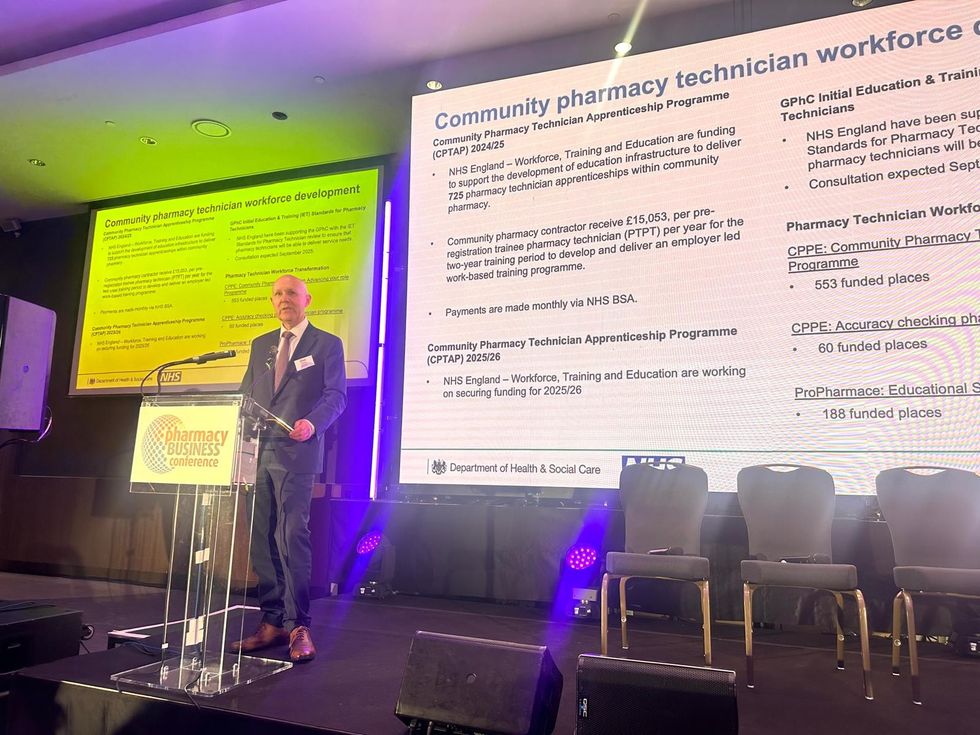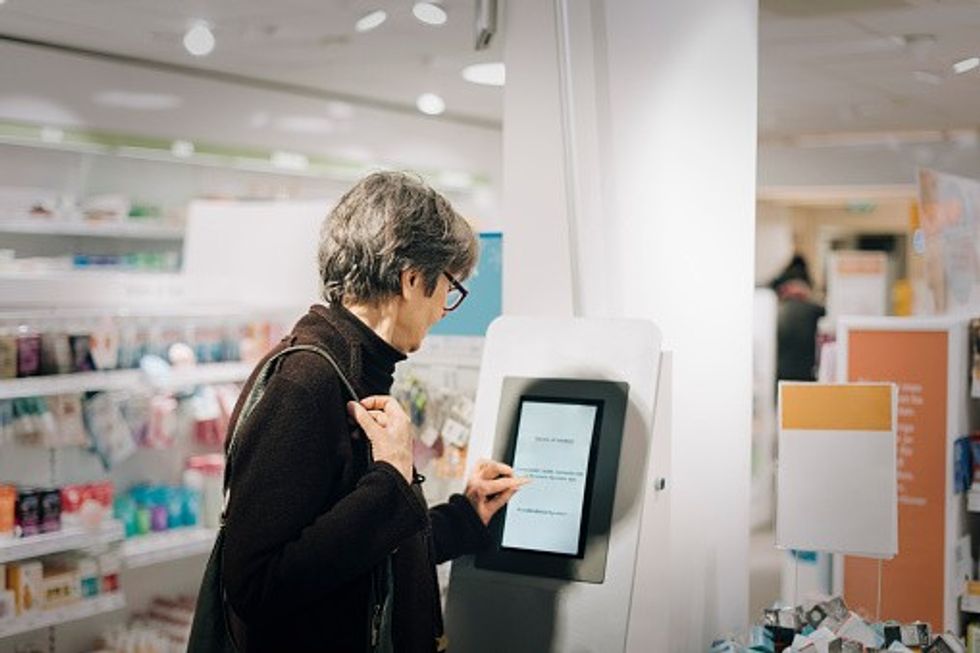A national prescribing service is “critical” for community pharmacy with all newly qualified pharmacists becoming independent prescribers from next year, according to Malcolm Harrison, chief executive of the Company Chemist Association (CCA).
“We are encouraging the NHS to work with community pharmacy to explore what that (prescribing service) could look like. There are pilots that are out there at the moment, and I know a number of pharmacies are engaged in those and exploring the different variations of what it could be,” Harrison told Pharmacy Business.
The Labour party said in its election manifesto last year that it will create a Community Pharmacist Prescribing Service, granting more pharmacists independent prescribing rights where clinically appropriate as part of its long-term plan to shift resources to primary care and community services.
Sadik Al-Hassan, an MP and pharmacist, said earlier this month that whilst the delivery of a national pharmacy-based prescribing service is “entirely possible and deliverable”, he felt it wouldn’t be possible for another two-three years due to “what we (pharmacists) do currently and it shouldn't be”.
Harrison believes expanding Pharmacy First would be a good first step towards a prescribing service.
“The Patient Group Directions (PGDs) are currently quite restrictive and that's the nature of the beast but we need to look at how we can allow prescribing outside of the PGD,” said Harrison.
“For example, if a lady who's 61 comes in with a UTI, with somebody with a prescribing qualification, or the competence to prescribe should be able to do that and be funded through the NHS to expand Pharmacy First - there's definitely an opportunity for that.
“Prescribing opens up the opportunities that community pharmacy can add value in supporting patients with managing long term conditions, either through diagnosis or through changing titrating medicines, looking at optimising medicines, stopping things that don't need to be taken anymore, making sure people are on the right dose and getting the best benefit from it.
“Prescribing is the future, I'm confident of that. It's quite an exciting future.”
- YouTubewww.youtube.com
Pharmacy funding
With rumours that the pharmacy funding contract will be announced early next week, Harrison has implored that it needs to reflect the “pressures pharmacies are under”.
Community pharmacy has seen around a 40 per cent cut to funding in real terms since 2017, forcing record numbers to close.
Around 1,300 pharmacies have shut down since 2017 including 29 since January.
“A number of our members have looked at their portfolios in recent years and have made significant changes to the structure of their organisations and to the numbers of pharmacies that they operate,” said Harrison.
“When it comes to pharmacies closing, CCA members have felt that acutely in terms of the impact on their business, and that's been done because they've had to manage costs.”
- YouTubewww.youtube.com
Harrison revealed he has had experienced first-hand the impact closure of pharmacies are having on the lives of patients.
“I had an eye infection recently. The town I was in at the time, three of the four pharmacies had closed permanently, and the one that was remaining wasn't open on the Sunday. I had to drive over 12 miles to find a pharmacy that was open,” he said.
“It is affecting patients and their ability to access care. I was able to find care but if my regular prescription wasn't available because the pharmacy wasn't open, that's going to affect me in a different way.”
He added: “One of the advantages of community pharmacy is the access they provide to care for the population and if that is continually eroded because they can no longer afford to operate the businesses in a way that does provide that benefit of access, that is to the detriment of patients and to healthcare in general.”
NPA collective action
The National Pharmacy Association (NPA) has announced its members will conduct collective action from April 1st that will lead to reduced opening hours and changes to services.
They also stressed that they will continue with their protest if a pharmacy contract is announced before then but is not sufficient to address the difficulties community pharmacy faces.
Harrison said that CCA members had considered similar action in the past with discussions held about the free delivery of medicines to patients and opening hours.
“We put out a report recently that over six million hours have been lost from the community pharmacy network, and that's six million fewer hours of access for patients. Two thirds of that's down to closures, but a third of it is down to just businesses contracting opening hours,” he said.
Clinical expertise
During the Labour Party conference, health minister Wes Streeting said he was focused on the government’s 10-Year Health Plan that is based on three big shifts - move from analogue to digital, hospital to community, and sickness to prevention.
With the announcement that NHS England will be abolished, the future of healthcare in the country will be experiencing major changes in the next two years.
- YouTubewww.youtube.com
Harrison explained that his vision for the future of community pharmacy is for it to be an integral part of the NHS in a “sustainable way that is funded properly”.
“We need to have a very honest conversation as a sector, with the government, with the NHS and with the department on what is it that they want pharmacy to do, and what can they afford and how do we match those two because I don't think they are currently aligned,” he said.
Whist pharmacists can continue to provide supply medicines on behalf of the NHS and the wraparound care to ensure patients safety, Harrison has called on the government to utilise the clinical skills of community pharmacists.
“We've seen over the last 12 months since the launch of Pharmacy First, there's a huge opportunity for pharmacy in urgent care,” he said.
“There is a network of over ten thousand pharmacies that people can walk in off the street and gain access to NHS care. Pharmacy First is a great first step. Now we need to look at how can we grow both in terms of the criteria for qualification for entry into Pharmacy First, but also the kind of the conditions that are contained in the scheme and how can we expand it further.
“Then there's long term conditions. As prescribing starts and pharmacists gain the capability to prescribe, how can we support people with long term conditions, which we know is a large part of where the time and cost of the NHS is spent.”
Vaccination programmes
From April 1st 2026, integrated care boards (ICBs) will become responsible for commissioning all vaccination services, as part of NHS England’s plan to delegate vaccination and screening (V&S) programmes.
Last month, the CCA-led Pharmacy Vaccinations Development Group (PVDG), a coalition of organisations representing the entire vaccines supply chain, urged the government to leverage community pharmacies in addressing declining vaccination rates.
“We're doing a lot of work looking at national vaccination programs and the increased and enhanced role pharmacy can play,” said Harrison.
“There is a real opportunity there, building on a strong track record that the sector already has.”
Long-term future
Harrison is confident community pharmacy can play a central role in the government’s plans to transform healthcare in the country.
“We can play our part in that longer-term strategy for the NHS, moving things out of hospital and into primary care, into the community, and by moving things from analogue into digital,” he said.
“Some of the enablers that we're starting to see through the likes of Pharmacy First, GP Connect and the national booking system - how do we integrate pharmacy into some of these digital systems that will enable pharmacists to do much more.”











![Potential Side Effects of Mounjaro [What You Need to Know]](https://www.pharmacy.biz/media-library/image.jpg?id=54516976&width=1245&height=700&quality=90&coordinates=0%2C29%2C0%2C29)


 Health Secretary Wes Streeting addresses Pharmacy Conference via video
Health Secretary Wes Streeting addresses Pharmacy Conference via video  David Webb, chief pharmaceutical officer of NHS England
David Webb, chief pharmaceutical officer of NHS England Shailesh Solanki, executive editor of Pharmacy Business
Shailesh Solanki, executive editor of Pharmacy Business L-R: Yasmin Karsan, Pritee Panchmatia and Fin McCaul
L-R: Yasmin Karsan, Pritee Panchmatia and Fin McCaul  L-R: Baba Akomolafe, Rachna Chhatralia, Patricia Tigenoah-Ojo and Raj Matharu
L-R: Baba Akomolafe, Rachna Chhatralia, Patricia Tigenoah-Ojo and Raj Matharu L- R: Nicola Stockmann, Robert Townsend, Atul Patel and Amerjit Singh
L- R: Nicola Stockmann, Robert Townsend, Atul Patel and Amerjit Singh Wole Ososami, lead pharmacist at Westbury Chemist
Wole Ososami, lead pharmacist at Westbury Chemist


 A woman using kiosk at pharmacy store gettyimages
A woman using kiosk at pharmacy store gettyimages  Pharmacist examining commissioning machine in pharmacy gettyimages
Pharmacist examining commissioning machine in pharmacy gettyimages